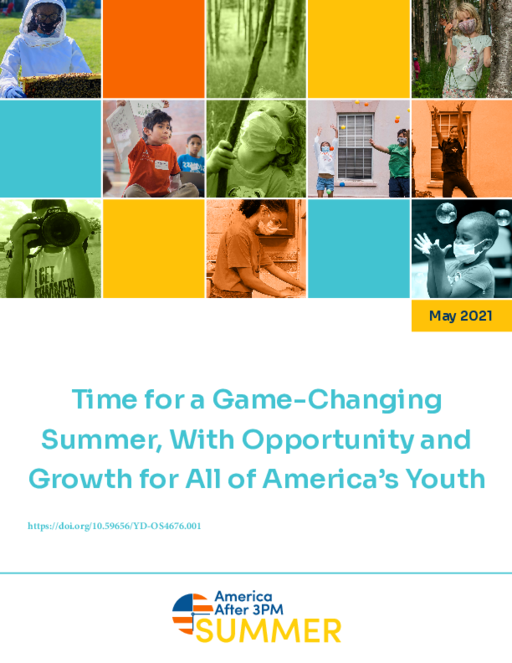Breadcrumb
- Wallace
- Reports
- America After 3Pm Time For A Gam...
America After 3PM
Time for a Game-Changing Summer, with Opportunity and Growth for All of America’s Youth

- Publisher(s)
- Afterschool Alliance and Edge Research
Summary
How we did this
The study findings are based on a nationally representative survey about summer 2019. Participants were randomly selected adults who live in the U.S. and are parents or guardians of a school-age child who lives in their household.
Fun. Friends. Growth. Summer has always been an important time for enrichment and learning in the lives of children.
This is especially true as Americans recover from the social, emotional, and academic disruptions of COVID-19. Making sure U.S. youth have access to structured summer enrichment opportunities post-pandemic is more important than ever.
Yet, demand for summer programming far outstripped program availability, even before the pandemic. Between 2008 and 2019, the number of families with children participating in summer programs nearly doubled, from 25 percent in 2008 to 47 percent in 2019. By 2019, for every child in a summer learning program, another was waiting to get in. Children in lower-income families were the most likely not to participate, with program cost a barrier to enrollment.
These are findings from America After 3PM: Time for a Game Changing Summer, with Opportunity and Growth for all America’s Youth. The Afterschool Alliance commissioned this study and Edge Research conducted the research. It uses data collected before and during the pandemic to assess children’s participation in summer programs.
The study also examines parent attitudes about summer learning. Parents whose children participate in summer learning are overwhelmingly satisfied with the experience. They value the development of life skills and want summer learning opportunities that are different from the school year. More than 85 percent of parents who identify as Democratic, Independent, and Republican are in favor of public funding of summer learning. Support reaches 90 percent in urban, Hispanic, and two-earner households.
But priorities also vary by parent income and race. Parents of families with low incomes place a greater emphasis, for example, on activities that reduce risky behaviors. Black parents are more likely to prioritize programs that keep youth from losing academic ground.
Time for a Game-Changing Summer is based on responses from more than 29,500 U.S. families. It builds on household surveys conducted in 2004, 2009 and 2014. It includes national-level findings from smaller surveys of parents and program providers conducted in summer and fall of 2020 and spring of 2021. It offers a snapshot of how children and youth spent their summers before and during the pandemic and has significant implications for our post-pandemic world.
Key Takeaways
- Demand for summer learning opportunities is growing. Participation in summer learning programs nearly doubled between 2008 and 2019.
- Unmet demand is high. A total of 12.6 million K-12 students—or 22 percent—participated in a structured summer experience in 2019. But the parents of another 13.9 million children were unable to enroll their children in the summer programs they hoped to find.
- Children from higher-income families have more access to summer learning opportunities. Some 27 percent of children in higher-income families participated in a structured summer experience in 2019, compared to just 14 percent of students in families with low incomes.
- Summer learning priorities vary by parent income and race. Parents of families with low incomes place a greater emphasis, for example, on activities that reduce risky behaviors. Black parents are more likely to prioritize programs that keep youth from losing academic ground.
- Cost is a barrier to participation. Two in five parents who did not have a child in a structured summer experience (39 percent) did not enroll owing to program cost.
- A majority of parents favor public funding for summer learning opportunities for students in communities without them. This support crosses demographic and political lines.

Academic enrichment is important, but parents prioritize building connections, exploration, and being active in the summer.
Visualizations






